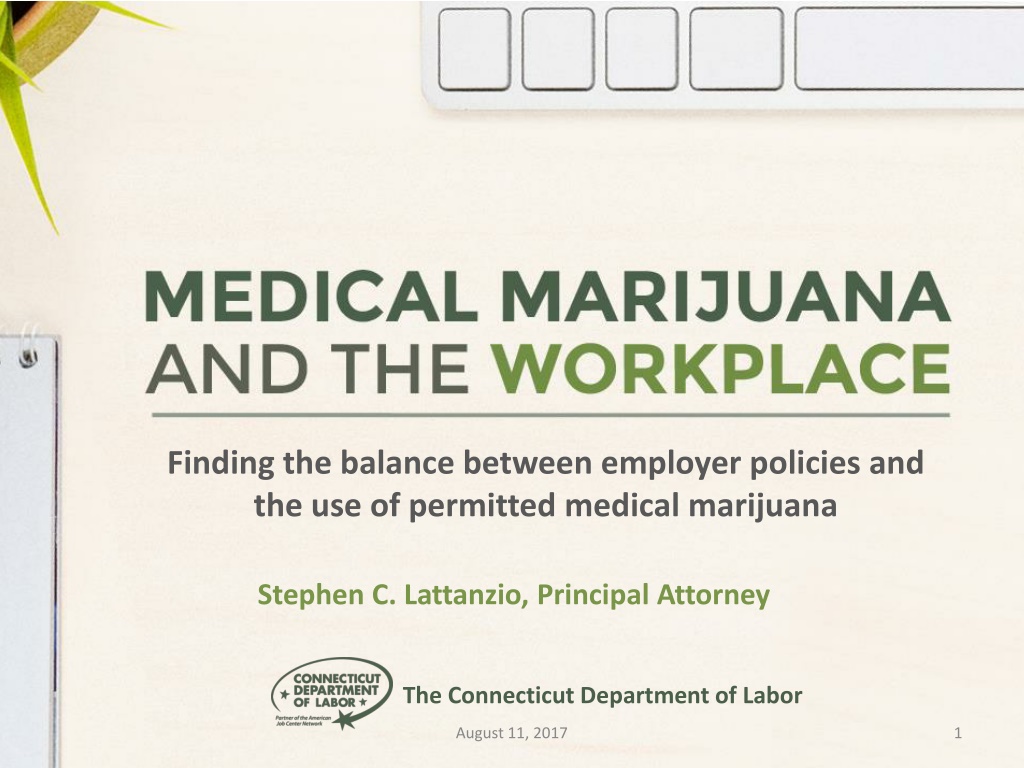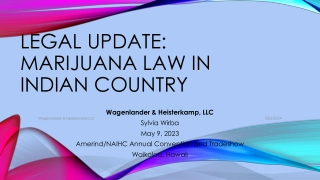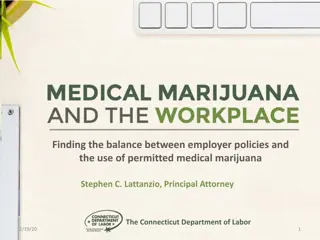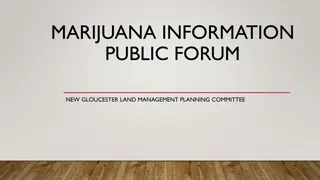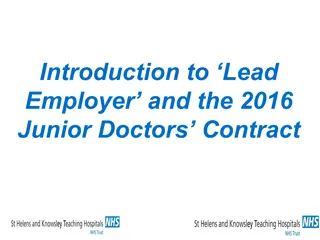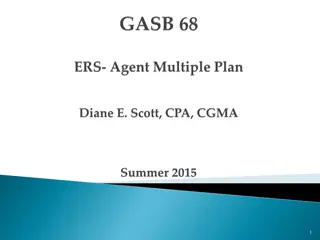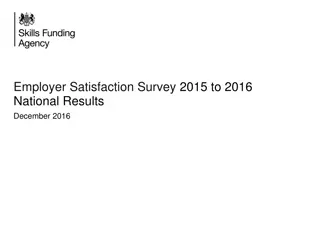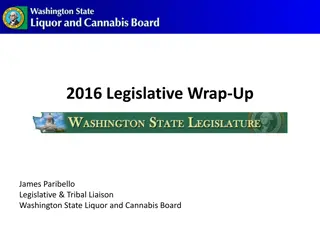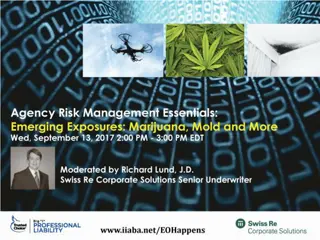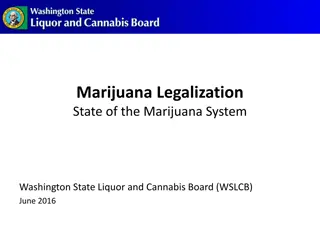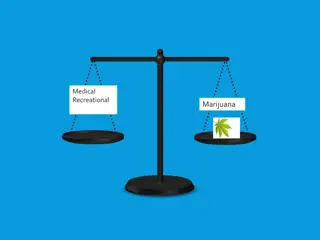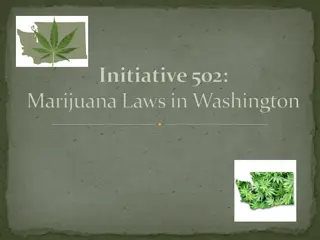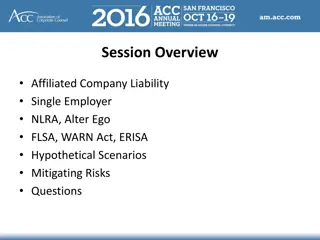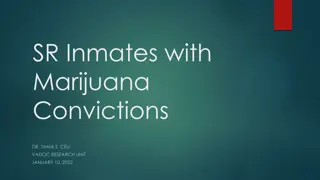Navigating Employer Policies on Permitted Medical Marijuana Use
Explore the delicate balance between employer policies and the use of permitted medical marijuana, focusing on Connecticut laws and regulations. Learn about the definitions, implications for the workplace, and the rights of qualifying patients under Conn. Gen. Stat. 21a-408 et seq.
Download Presentation

Please find below an Image/Link to download the presentation.
The content on the website is provided AS IS for your information and personal use only. It may not be sold, licensed, or shared on other websites without obtaining consent from the author. Download presentation by click this link. If you encounter any issues during the download, it is possible that the publisher has removed the file from their server.
E N D
Presentation Transcript
Finding the balance between employer policies and the use of permitted medical marijuana Stephen C. Lattanzio, Principal Attorney The Connecticut Department of Labor August 11, 2017 1
Purpose of Program Academic advancement of the law No jeopardy to any participant CTDOL is complaint-driven; agency duty bound to investigate if complaint filed. Method to the Madness August 11, 2017 2
Overview Highlights of 21a-408 et seq. Definitions Main provisions Interplay with Existing Federal/ State Law Practical Considerations Physician s (MRO s) Perspective August 11, 2017 3
Highlights of Conn. Gen. Stat. 21a-408 et seq. Signed by Governor Malloy May 31, 2012 Effective October 1, 2012 Department of Consumer Protection Has regulatory authority Two (2) Main Impacts to Workplace: (1) Prohibition Against Adverse Employment Actions; and (2) Prohibition of Palliative Use at Workplace August 11, 2017 4
Definitions Palliative Use 21a-408(6) the acquisition, distribution, transfer, possession, use or transportation of marijuana or paraphernalia from the patient s primary caregiver to the qualifying patient, to alleviate a qualifying patient s symptoms of a debilitating medical condition (Emphasis added.) August 11, 2017 5
Definitions (cont.) Qualifying Patient - 21a-408(10) 18 years of age or older Resident of Connecticut Has been diagnosed by a physician as having a debilitating medical condition Must register with DCP to obtain valid registration certificate prior to engaging in use. August 11, 2017 6
Definitions (cont.) Difference in Definition of Employer 21a-408p(a)(3) - means a person engaged in business who has 1 or more employees, including the state and any political subdivisions of the state. 31-51t - means any individual, corporation, partnership or unincorporated association, excluding the state or any political subdivision thereof. August 11, 2017 7
Definitions (cont.) Question/Thoughts???: What if a municipal employee claims he/she was fired for palliative use of marijuana does the CTDOL have jurisdiction? Municipality definition Notan employer per 31-51t An employer per 21a-408p(a)(3) DCP has exclusive jurisdiction. August 11, 2017 8
Definitions (cont.) Debilitating Medical Condition 21a-408(2) List of medical conditions including cancer, glaucoma, Parkinson s disease, MS, etc., OR Any medical condition approved by the Department of Consumer Protection (DCP). August 11, 2017 9
Medical conditions (contd) Currently, there are: 22 conditions for adults*; and 6 conditions for children under 18 years old. * Includes 7 conditions recommended by Medical Marijuana Program Board of Physicians August 11, 2017 10
I. No Adverse Action 21a-408p(b)(3) No employer may refuse to hire a person or may discharge, penalize or threaten an employee solely on the basis of such person s or employee s status as a qualifying patient or primary caregiver. In effect, creates a protected classfor Qualifying patients; and Primary caregivers. August 11, 2017 11
No Adverse Action (cont.) Obvious significance of the word solely Limiting word Places high burden on person/employee to prove no other factor entered employer s decision-making process. May employer consider marijuana use as one of many factors? August 11, 2017 12
Benefit of Certification Qualifying patients and caregivers are immune from arrest and prosecution under state law, and cannot be subject to civil or other penalties. Query: What about federallaw? (See slides beginning at #36.) August 11, 2017 13
II. Use at Workplace Statutory Language - 21a-408p(b)(3)&(c) Nothing shall restrict an employer s ability to: Prohibit the use of intoxicating substances during work hours or Discipline an employee for being under the influence of intoxicating substancesduring work hours. August 11, 2017 14
Definition of Palliative Use the acquisition, distribution, transfer, possession, use or transportation of marijuana or paraphernalia relating to marijuana, including the transfer of marijuana and paraphernalia relating to marijuana from the patient s primary caregiver to the qualifying patient but does not include any such use of marijuana by any person other than the qualifying patient. (Emphasis added.) See Conn. Gen. Stat. 21a-408(6) August 11, 2017 15
Use at Workplace (Cont.) Nothing shall be construed to permit: the palliative use of marijuana in violation of 21a-408a(b). 21a-408a(b)(2): No protection for ingestion of marijuana In the workplace; In a motor bus or school bus; In any public place; In presence of person under age 18. August 11, 2017 16
Possession v. Ingestion: (Cont.) 21a-408(6) Includes possession in definition of Palliative use 21a-408a(b) Prohibits palliative use that is ingestion Apparent difference between the words possession and ingestion ? (Yes) August 11, 2017 17
Use at Workplace (Cont.) Net Effect = Same treatment as any other intoxicating substance at work Employer can regulate intoxication at workplace ( during work hours ) Thus, employer is free to regulate being under the influence of intoxicating substances Words intoxicating substances chosen carefully Exact same language used in 31-51y(b) August 11, 2017 18
Use at Workplace (Cont.) Current Drug Testing Statute 31-51x provides: Employer may subject employee to reasonable suspicion testing if employee is under the influence of drugs or alcohol which adversely affects or could adversely affectsuch employee s job performance Note the use of the present tense language. Observations must be contemporaneous with request to test. August 11, 2017 19
Questions: Age-old Question = Possession Queries: Can mere possession of marijuana by a qualifying patient subject employee to an adverse employment action? Only to extent the possession violates 21a-408a(b), that is, ingestion. August 11, 2017 20
Possession v. Ingestion Current State Drug Testing Law Requires that employee is under the influence of drugs or alcohol which adversely affects or could adversely affectsuch employee s job performance Seems to presume ingestion Seems to require manifestation of symptoms Mere possession is insufficient basis August 11, 2017 21
Questions (Cont.): May employee use/ingest marijuana off siteduring course of work day? Possibly to the extent that the employee does not become under the influence of intoxicating substances at work place. August 11, 2017 22
Impact to Drug Testing Employer may test to same extent as any other legitimately prescribed drug medications. Reminder: CTDOLonlyregulates urinalysisdrug/alcohol testing. August 11, 2017 23
Impact to Drug Testing (Cont.) Positive (urinalysis) test results: Mandated/Regulated tests, (e.g., random for CDL DOT testing, high-risk, safety-sensitive employees, school bus drivers, etc.) MRO must conduct a verification interview with the employee to determine whether there is a legitimate medical explanation for the positive result Employee must present information , e.g., prescriptions, which form the basis of a legitimate medical explanation for the positive test. August 11, 2017 24
Impact to Drug Testing (Cont.) Use of a drug can only constitute a legitimate medical explanation when used for its proper and intended purpose. 49 CFR 40.137(e)(3). Must be used in accordance with dosage stated in prescription. August 11, 2017 25
Impact to Drug Testing (Cont.) Forpositivetest results in mandated/ regulated scenarios: Certain tested substances have no legitimate medical use: (1) marijuana (federal); (2) heroin; and (3) PCP. If the MRO determines that there IS a legitimate medical explanation, the MRO must verify the test result as negative. 49 CFR 40.137(d). Therefore, MRO MAYnot disclose existence of drug in employee s system to the employer. August 11, 2017 26
Added MRO Duty However, even when federal law recognizes the presence of a legitimate drug, i.e., valium, and the MRO verifies positive test result to negative; the MRO still may be required to inform the employer of the drug test result. MRO required to raise fitness for duty considerations with the employer. (See 49 CFR 40.137). Without employee s consent, MRO may report drug test results if MRO believes continued performance of safety-sensitive function is likely to pose significant safety risk. (See 49 CFR 40.327). August 11, 2017 27
Non-Federal Context But what about a State mandated/regulated test? Scenario: Non-federal, non-mandated/regulated positive test for valium or marijuana, (e.g., 14-261b permissive random of driver of > 10,001 lbs. but < 26,000 lbs., or pre-employment test); MRO persuaded that legitimate medical explanation exists Does MRO change positive test to negative? (Yes) Does MRO follow federal procedures above , i.e., inform employer of fitness for duty concerns? (No) August 11, 2017 28
Marijuana Certificate Question: Is a valid registration certificate for marijuana the equivalent of a prescription? 49 CFR Part 40 40.137 provides: the employee must present information [proving a legitimate medical explanation] There is norequirement of a prescription . August 11, 2017 29
Marijuana Certificate Query: If an employee s primary caregiver presents the MRO with proof that the employee is a qualifying patient and has been issued a valid registration certificate for the palliative use of marijuana, is that a sufficient medical explanation to verify the (mandated/regulated) test result as negative? August 11, 2017 30
Federal Law Federal Law Answer: 49 CFR 40.151(e). [An MRO] must not verify a test negative based on information that a physician recommended that the employee use a drug listed in Schedule I of the Controlled Substances Act. (e.g., under a state law that purports to authorize such recommendations, such as the medical marijuana laws that some states have adopted). (Emphasis added.) August 11, 2017 31
Controlled Substance I* Significance of Controlled Substance I: (1) a high potential for abuse; (2) no currently acceptable medical use... See 21 U.S.C. 812 (b)(1). Thus, federal law does not recognize medical marijuana as a legitimate medical explanation because it is a Controlled Substance I. * Marijuana has been a Controlled Substance I under federal law since 1970, with the passage of the Controlled Substances Act. August 11, 2017 32
State Law Reclassification However, Conn. Gen. Stat. 21a-243(e) mandated that DCP reclassify marijuana from Schedule I to II as a controlled substance. Conn. State Agencies Regs. 21a-243-8(g) reclassified marijuana as a Schedule II controlled substance. *Effective 9/17/13 August 11, 2017 33
Federal Law v. State Law Federal law has NOT reclassified marijuana as Controlled Substance II. Still recognizes marijuana as Controlled Substance I. 8/11/16 DEA refused to reclassify marijuana as a Controlled Substance II. August 11, 2017 34
Federal Law v. State Law (Contd.) DOT Office* Compliance Notice state initiatives will have nobearing on DOT s regulateddrug testing program. The DOT s Drug and Alcohol Testing Regulation 49 CFR Part 40 does not authorize the use of Schedule I drugs, including marijuana, for any reason. an MRO will not verify a drug test negative based upon information that a physician recommended that the employee use medical marijuana (Emphasis supplied.) *Office of the Secretary of Transportation, 12/3/12 August 11, 2017 35
Federal Law v. State Law (Contd.) Accordingly, federallaw at odds with state medical marijuana law. Significance: Employee protections from arrest, discharge, penalty, threatening, etc. under state law do NOT apply if federal law applies, i.e., CDL DOT testing, etc. Conn. Gen. Stat. 21a-408p(b) permits employers to follow federal law without penalty. August 11, 2017 36
Federal Law v. State Law: Criminal Ramifications? while the Department of Justice does not focus its limited resources on seriously ill individuals who use marijuana in compliance with state law the DOJ maintains the authority to enforce the CSA [Controlled Substances Act] vigorously against individuals and organizations that participate in unlawful manufacturing and distribution, even if such activities are permitted under state law. (Emphasis supplied.) - David Fein, US Attorney District of CT, Letter, 4/23/12 August 11, 2017 37
Federal Law v. State Law: Criminal Ramifications? (Cont d.) Former (Obama) Attorney General Holder: The Justice Department will not attempt to challenge state laws that allow for the medical and recreational use of marijuana as long as the drug sales do not conflict with eight new federal enforcement priorities. Those [priorities] include the distribution of marijuana to minors and sales that assist or act as cover for trafficking operations... SeeUSA TodayArticle Justice Department Won t Challenge State Marijuana Laws, 8/29/13 August 11, 2017 38
Federal Law v. State Law: Criminal Ramifications? (Cont d.) Presently, federal authorities, i.e., US Justice Department, are seeking to abolish the current policy prohibiting use of federal funds to prosecute medical marijuana patients and physicians. Thus, federal authorities could seek to enforce the Controlled Substances Act (federal law classifying marijuana as Controlled Substance I). SeeWashington PostArticle, Jeff Sessions Personally Asked Congress to Let Him Prosecute Medical Marijuana Providers, 6/13/17. August 11, 2017 39
Federal Law v. State Law (Contd.) Federal law at odds with public opinion April, 2017 Quinnipiac Poll: Medical marijuana is incredibly popular; Supported by 94% of public; Nearly 75% of public disapprove of federal government enforcing federal laws in states that have approved medical marijuana use. August 11, 2017 40
CT Statistics as of 7/23/17 715 doctors ( primary caregivers ) 19,223 qualifying patients : 4,775 patients in Hartford County; 4,462 in New Haven County; 3,916 in Fairfield County; 2,130 in New London County; 1,181 in Litchfield County; 1,168 in Middlesex County; 932 in Tolland County; 669 in Windham County August 11, 2017 41
Practical Problems Medical Issues: Urinalysis cannot determine: When marijuana was ingested, i.e., > 30 days Quantity in system at time of test Level of impairment unlike alcohol Chronic or acute user August 11, 2017 42
Practical Problems (Contd.) CT DUI Conn. Gen. Stat. 14-227a(a) provides: Under the Influence means: elevated blood alcoholcontent means a ratio of alcohol in the blood of such person that is eight hundredths of one per cent or more of alcohol, by weight, except that if such person is operating a commercial motor vehicle, elevated blood alcohol content means a ratio of alcohol in the blood of such person that is four-hundredths of one per cent or more of alcohol, by weight (Emphasis Supplied.) August 11, 2017 43
Practical Problems (Contd.) MRO Issues: Excused positive marijuana Pressure from employer as client to know results, i.e., I m paying for this test. What panel to use must an employer test for marijuana? Any consent issues confronting MRO? August 11, 2017 44
Practical Problems (Contd.) Notice to Employer: HR policy requires employee to inform employer of need to take medication MRO notice: excused positive marijuana Insurance concerns: Risk of liability Other problems? August 11, 2017 45
Practical Problems (Contd.) Scenario: In-the-field employee voluntarily tells manager (who informs superiors) that employee has a medical marijuana card: What are employer s concerns? Can employer subject employee to a test? No immediate supervision in the field (thus, hard to conduct reasonable suspicion test) If accident occurs, is employer liable for knowing that employee is marijuana user? August 11, 2017 46
Unemployment Compensation Benefits Denied: Claimant (CDL driver) who tested positive for medical marijuana on random mandatory /regulated federal DOT drug test is disqualified from receiving unemployment compensation benefits. MRO confirmed positive test pursuant to federal regulations (i.e., did not change result to negative). Claimant discharged pursuant to federal law. CT medical marijuana law did not apply. See Meade v. City of New Haven, Board Case No. 340-BR-17 (5/26/17). August 11, 2017 47
Rhode Island Case Employee required by employer to take (non-mandatory/regulated) pre-employment drug test; Employee tested positive for marijuana; Employer s policy prohibited drug use on property; Employer did not hire the employee solely due to employee s status as medical marijuana cardholder; Employee sued the employer Court decision: held for Employee under state law Callaghan v. Darlington Fabrics Corp., et al., No. PC-2014- 5680 (R.I. Super. Ct., May 23, 2017) August 11, 2017 48
Michigan Case Wal-Mart employee obtained certification card; Employee failed mandated /regulated post-accident test (after twisting knee while pushing a cart); Wal-Mart fired the employee based solely on his status as a marijuana card holder; Semi-ambiguous language of MI statute prohibited discrimination by a business or occupational or professional licensing board Court decision: state law protections did not apply to a private company, only to adverse actions by the state ( business licensing board ). Casias v. Wal-Mart Stores, Inc., 695 F.3d 428 (6th Circuit Court of Appeals) 9/19/12 August 11, 2017 49
Michigan Case Wal-Mart employee obtained certification card; Employee failed mandated /regulated post-accident test (after twisting knee while pushing a cart); Wal-Mart fired the employee based solely on his status as a marijuana card holder; Semi-ambiguous language of MI statute prohibited discrimination by a business or occupational or professional licensing board Court decision: state law protections did not apply to a private company, only to adverse actions by the state ( business licensing board ). Casias v. Wal-Mart Stores, Inc., 695 F.3d 428 (6th Circuit Court of Appeals) 9/19/12 August 11, 2017 50
